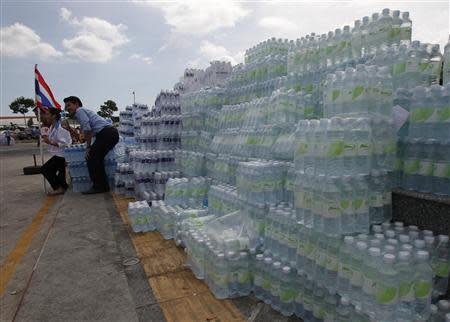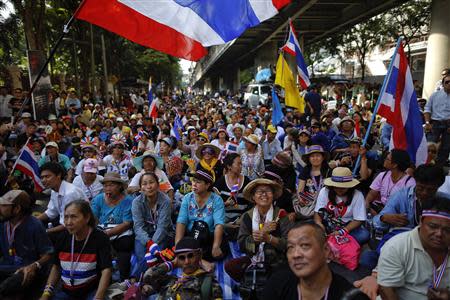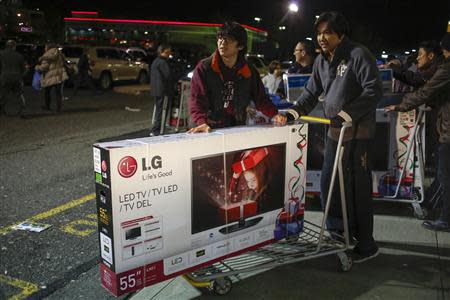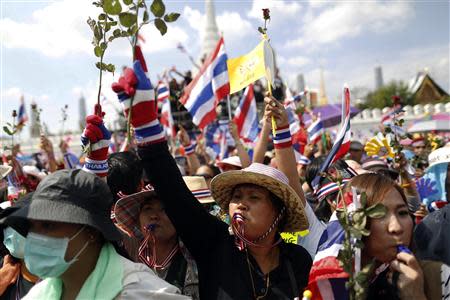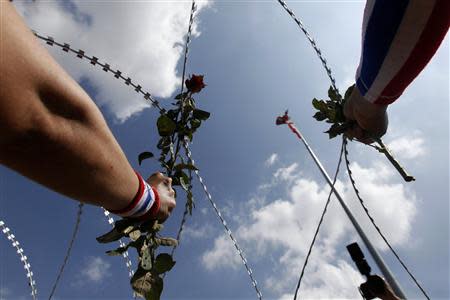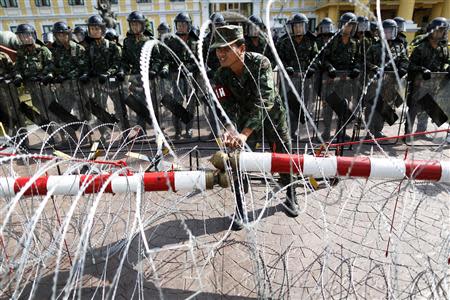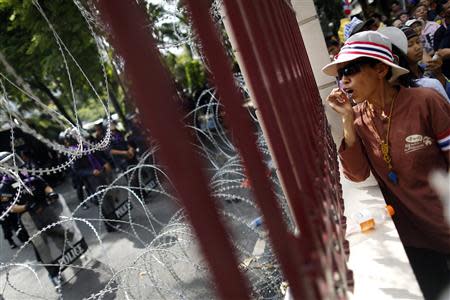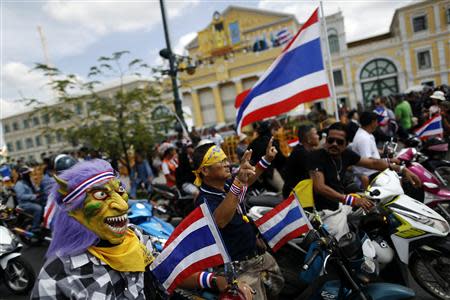Anti-government protesters break into Thai army compound
By Amy Sawitta Lefevre and Pracha Hariraksapitak BANGKOK (Reuters) - Anti-government protesters briefly forced their way into the compound of Thailand's army headquarters on Friday in a dramatic escalation of city-wide demonstrations seeking to topple Prime Minister Yingluck Shinawatra. Protesters burst into the army base Bangkok's historic quarter, waving flags and blowing whistles. In another district, about 1,000 people massed outside Yingluck's ruling party headquarters, shouting "get out". The invasion of army headquarters deepened a conflict broadly pitting the urban middle class against the mostly rural supporters of Yingluck and her brother, Thaksin Shinawatra, a former prime minister who was ousted in a 2006 coup and who remains central to Thailand's eight years of on-off turmoil. The demonstrators left the headquarters peacefully after a few hours and late on Friday, protest leader Suthep Thaugsuban told his supporters to increase the pressure and target main state buildings on Sunday, including the headquarters of city and police, four ministries and Government House, Yingluck's offices. "Don't wait for anyone. Every heart that loves this country must stand up together and execute our mission as one," Suthep told a crowd of 7,000 massed outside a state office complex. "On Sunday, brothers and sisters, we will announce our victory and our defeat of the Thaksin regime." The protesters accuse Yingluck of abusing her party's parliamentary majority to push through laws that strengthen the behind-the-scenes power of her populist self-exiled, billionaire brother. They have rejected her calls for talks. Although the army moved its main command centre to a military camp in Bangkok's northern suburbs three days ago, the siege of its grounds by protesters is deeply symbolic and highlights the military's pivotal role in a country that has seen 18 successful or attempted coups in the past 80 years. After forcing open the compound's gates, protesters swarmed inside, demanding the generals choose sides as hundreds of soldiers watched from the balconies of the 19th-century cream-colored building. CHOOSE A SIDE "We want the head of Thailand's armed forces to choose whether they stand by the government or with the people," Uthai Yodmanee, a protest leader, said from the back of a truck. Yingluck has courted the powerful army, which asked protesters not to pressure it to take sides and to consider revered King Bhumibol Adulyadej, who turns 87 on December 5. "We are ready to help the Thai people if there is violence. We hope all sides will unite and not use the army as a tool," army chief Prayuth Chan-ocha said in a statement. "It might make His Majesty feel uneasy if Thais fight among themselves." Compare that with 2008, when the military sided with protesters who helped to topple two Thaksin-allied governments. In October 2008, after clashes between police and demonstrators rallying against then-Prime Minister Somchai Wongsawat, Thaksin's brother-in-law, then-army chief Anupong Paochinda publicly urged Somchai to step down. Memories of that help explain why Yingluck appears to have studiously avoided a confrontation during six days of protests against her government. Police have been restrained, separated by gates and razor wire from protesters who at times pelt them with plastic water bottles and shout insults. Police, however, are braced for clashes. "We have received intelligence reports that there could be violence," they said in a statement. Leader of the opposition Democrat party, Abhisit Vejjajiva, former prime minister of a military-backed government that Yingluck routed in a 2011 election, joined the protests on Friday with other senior Democrats including former finance minister Korn Chatikavanij. "When the government acts above the law, the people no longer need to respect the government," Korn told the crowd. Thaksin's rural and working-class support has ensured he or his allies have won every election in the past decade. His opponents say he has politicized and bought off the poor with cheap credit, healthcare and wasteful subsidies. Yingluck has ruled out resigning or dissolving parliament, and appears intent on riding out the storm. HISTORIC FIGHT Suthep, a deputy prime minister in the previous Democrat-led government, urged protesters to shut down a government office complex and surround the ministries of interior, education labor and foreign affairs, two state-run telecommunications firms, and even the city's zoo. "We need to break the law a little bit to achieve our goals ... and we will accept the punishment for it," he said. "This is a historic fight and the world must remember it." Yingluck had governed for two years without a major challenge until last month, when her party tried to ram through an amnesty bill that would have expunged Thaksin's 2008 graft conviction and cleared the way for his political comeback. The Senate rejected it, and Yingluck then shelved it, but the protests escalated, switching from a campaign against the amnesty to a bid to bring down the government. Among the protagonists in Thailand's dysfunctional democracy are those who revile Thaksin's authoritarianism - generals, aristocrats, big businessmen and royal advisers - who accuse Thaksin of graft and disloyalty to the monarchy. Thaksin, who lives mainly in Dubai, has refuted those charges. The demonstrators are at five locations in Bangkok, three in its historic heart, one on its northern fringe and one at the Finance Ministry, which they have occupied since Monday. (Additional reporting by Pairat Temphairojana; Writing by Jason Szep; Editing by Robert Birsel)



